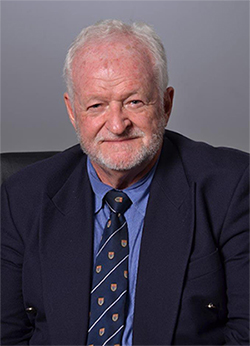
Producing over 40% of teachers in South Africa
 At the fifth World Congress on Education Research, held in St Petersburg, Russia, Prof Phillip Higgs presented his work on indigenous African knowledge and education. His critical reflection opened up the way to discourse at the event, devised to promote growth in research in far-reaching countries with diverse cultures. The event spanned the 12th to the 14th of June and welcomed delegates across the globe to discuss the latest notions and ideals in education research. As the world moves closer to the global village, the World Congress on Education Research is one of many that aims, not to codify, but to explore the diversity of individual cultures, and the knowledge that such cultures can bring to education across the globe.
At the fifth World Congress on Education Research, held in St Petersburg, Russia, Prof Phillip Higgs presented his work on indigenous African knowledge and education. His critical reflection opened up the way to discourse at the event, devised to promote growth in research in far-reaching countries with diverse cultures. The event spanned the 12th to the 14th of June and welcomed delegates across the globe to discuss the latest notions and ideals in education research. As the world moves closer to the global village, the World Congress on Education Research is one of many that aims, not to codify, but to explore the diversity of individual cultures, and the knowledge that such cultures can bring to education across the globe.
Higgs presented specifically on indigenous African knowledge and the implications that the “dismantling of hegemonic colonial rule in Africa” might have for the transformation of education in Africa. He noted the need to acknowledge indigenous African knowledge when devising education systems and researching further into the field in order to change the face of education across Africa.
“Much of the history of Africa has been dominated by colonial occupation, and colonialism in Africa has provided the framework for the organised subjugation of the cultural, scientific, and economic life of many on the African continent. This subjugation ignored indigenous African knowledge systems and impacted on African people’s way of seeing and acting in the world,” says Higgs, laying out the foundations, the need for further research into the dilemma. “This state of affairs has given rise to numerous attempts to reassert the significance of indigenous African knowledge in the face of hegemonic Western forms of knowledge which have determined the discourse on education in Africa from the onset of colonial occupation.”
Higgs goes on to note that the history of African countries has been undermined by the domination of Western civilisation. He clarifies that this domination has taken the form of “slave trade, colonialism, neo-colonialism, and globalisation,” among others and that indigenous African knowledge has thus been devalued in favour of the hegemony of Western knowledge. “The West uses this hegemonic discourse as an apparatus of control to sustain an unequal relationship between what they would call ‘developed’ and ‘under-developed’ countries.” His work continues to argue that subjugation such as colonialism and slavery negatively impacted on the growth of African cultures, twisting them instead to reflect that of Western cultures.
He argues that “continual displacement” needs to be observed in both a Western and African approach to that which is seen as valid knowledge, in order to ensure that neither obtains the upper hand over the other in education discourse in Africa. This will ensure that African forms of knowledge are acknowledged in African education curricula, that a “fusion of epistemologies” will encourage critical evaluation of the curricula. This will also illuminate issues of alienation and domination in further discourse. “A ‘fusion of epistemologies in education’, which seeks to integrate both indigenous African and Western forms of knowledge in education, will see knowledge development as a holistic journey that includes process, content and the socio-cultural context in which learning is being modelled.”
“In light of [the colonial occupation of Africa], indigenous peoples in Africa need to re-assert themselves in the proclamation, acclamation, and reclamation of their indigenous knowledges in challenging what I refer to as, the ‘epistemic colonisation’ of these knowledges, and especially with regard to education,” says Higgs. “This reclamation should, however, not exclude and negate Western forms of knowledge but should rather be directed at a ‘fusion of epistemologies’ which seeks to integrate both indigenous African and Western forms of knowledge in education.”
*By Carmen Taxer
Publish date: 2017-09-12 00:00:00.0